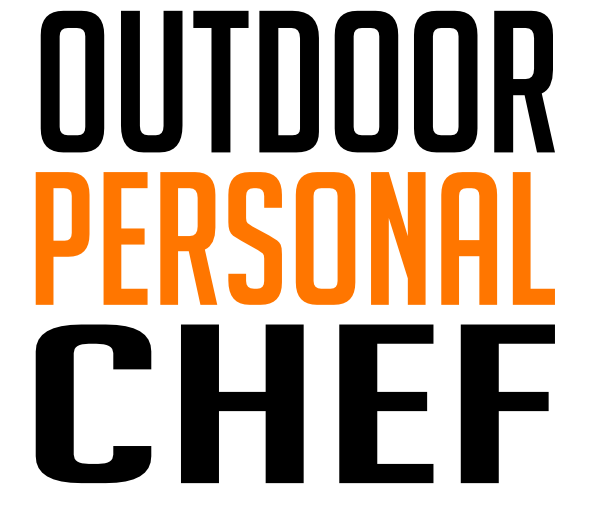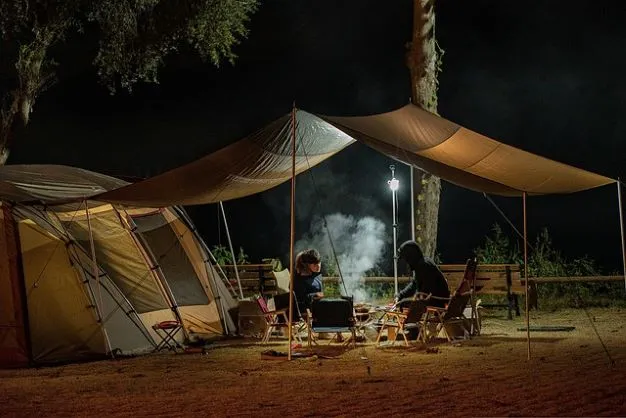Irish Guide to Wild Camping in Ireland
I’ve been wild camping in Ireland for over 20 years and have visited some of the country’s most beautiful, scenic places. In this article, I will give you all the secrets and tips to wild camping in Ireland. I would love for everyone to experience the beauty of Wild Ireland for themselves. To create amazing memories of scenic hills, babbling brooks and the ever-present sheep saying hello from afar.
Wild Camping in Ireland is a true gift, and with the information provided in this article, you will be best prepared to receive this gift and enjoy it to its fullest.
Table of Contents
Wild Camping in Ireland
Wild camping is an amazing experience; it allows you to get up close and personal with nature. You can experience all that Ireland offers while wild camping; it’s a great way to connect with the landscape and the environment. Before embarking on your wild camping adventure in Ireland, you need to consider a few things.
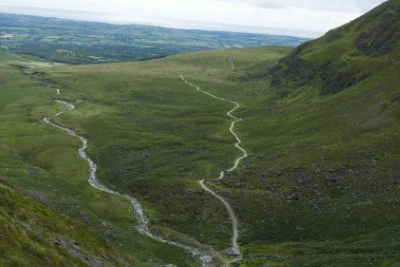
What is Wild Camping?
Wild camping is ” in a remote or unused area, usually in the countryside.” Wild camping in Ireland is about getting away from the hustle and bustle of a busy life. Getting out into ‘Nature’ and enjoying the sites, sounds and experience of being away from populated areas.
There are no specific rules or regulations regarding wild camping in Ireland, but there are some important things to remember before setting off.
The Definition of Wild Camping
The definition of wild camping can vary depending on who you ask. For some people, it might only refer to camping in areas completely off the grid – without amenities like toilets, showers or running water. For others, it might mean camping outside an official campground or caravan park.
As long as you’re not trespassing on private land and following the basic principles of Leave No Trace, you’re generally okay to wild camp wherever you like in Ireland.
The Benefits of Wild Camping in Ireland
There are many benefits to wild camping, here are just a few:
- You get to experience nature at its finest
- It’s a great way to connect with the landscape and the environment
- You can save money by camping for free instead of paying for a campsite
- It’s a more authentic way to travel and see a country
- You have the freedom to camp wherever you like, whenever you like
- You get a break away from a busy life to have good me time
- Creating memories that will last you a lifetime
What You Need to Know Before Wild Camping in Ireland
Now that you know what wild camping is and the benefits of wild camping, let’s talk about what you need to know before embarking on your adventure.
You will need to be completely self-sufficient when wild camping in Ireland. This means bringing all the supplies and equipment you need with you, including food, water, shelter, a first-aid kit, etc.
- Be sure to check the weather forecast before setting off on your trip. You don’t want to get caught in a storm! In Ireland, the weather can change at the drop of a hat. You can experience all the seasons in one day, even on the best days in summer.
- It’s always best to camp in groups when wild camping in Ireland. Not only is it more fun, but it’s also safer.
- Make sure you know your surroundings and where you are camping before setting up the night. This includes knowing things like the tides if you’re near the coast or avoiding areas that might be prone to flooding.
- Leave no trace! This is one of the most important principles of wild camping. Be sure to leave your campsite as you found it, and take all your rubbish with you.
- Respect the land and the people who live there. This means being considerate of your noise level, not leaving any litter behind, and respecting any livestock or wildlife, you might encounter.
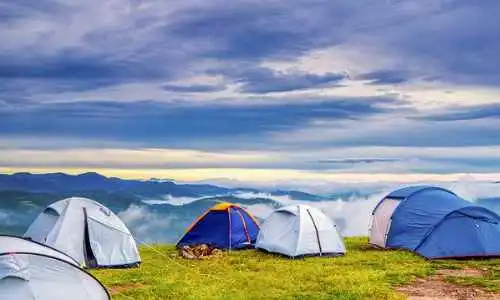
Is Wild Camping Legal in Ireland?
The short answer is that wild camping is legal in Ireland, with a few exceptions. Camping on private land in Ireland is Illegal without the express permission of the landowner.
The problem with wild camping is that the majority of land in the countryside is privately owned. This means wild camping in these locations would be illegal unless permission is granted.
The good news, however, is that some of the most remote places in Ireland tend to allow camping without any issue. Most of these locations are pinpointed on maps or camping apps, and as long as you leave no trace and don’t abuse the use of land, there is never a problem.
Coillte manages some 7% of outdoor land belonging to the state to manage state forests on behalf of the Irish Government. Coillte has some national parks and forests where camping is permitted, which is legal with some guild-lines. Visit Coilltes website for more information.
However, a few things to keep in mind before pitching your tent are:
- In most cases, you need the landowner’s permission if you want to camp on private property; asking locals will often tell you where to stop and ask for permission. Most farmers have no problem if you can show you know what you are doing and plan to be respectful while camping.
- There are some areas where wild camping is not allowed, such as National Parks and Nature Reserves.
- You also need to know the local bylaws where you want to camp. For example, some areas might ban open fires or overnight camping.
Camping laws in Northern Ireland may differ from the Republic of Ireland due to the North under English rule.
What Equipment Do I Need To Camp in Ireland?
Now that you know what you need to know before wild camping in Ireland let’s discuss the equipment you need. When I go camping, what I bring with me is tailored to my personal needs and comforts. As you get used to camping in the wild, you will find out what is essential and what you can leave behind.
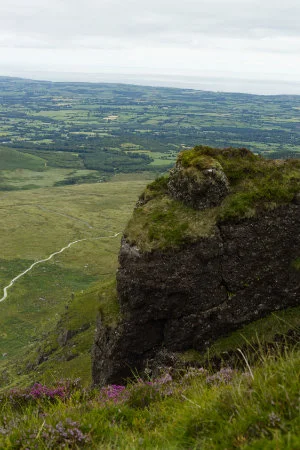
Wild Camping Checklist
- Tent: Of course, you will need a tent or other form of shelter for wild camping! Shelters can come in many forms, such as a tent, bivy bag or a hammock with a tarp. You can always rent one from a local outdoor shop if you don’t have a shelter. Just be sure to get a shelter appropriate for the weather conditions in Ireland and the location you are camping in.
- Sleeping bag: A good sleeping bag is essential for a comfortable night’s sleep. Again, be sure to get one that is appropriate for the weather conditions in Ireland.
- Sleeping Pad: A good sleeping platform on which to put your sleeping bag is essential. Using a sleeping pad is a basic way to start, or you could choose an inflatable mattress or camping cot. Weight and portability are always needed to be factored in. Choose the best one to suit your needs.
- Cooking supplies: You will need basic cooking supplies, such as a stove, pots and pans, utensils, etc. If you’re planning on doing a lot of cooking, you might want to bring along a cooler, but these add a lot of extra weight.
- Food and water: Be sure to bring enough food and water for your entire trip. It’s always better to have too much than not enough! A great way to get fresh water is to take water from a nearby stream. Just make sure you boil it before drinking, or you can use chemicals or filters to treat it; just because it’s a fresh stream doesn’t mean it’s safe to drink. Catching a bug from drinking bad water will end a fantastic hiking trip fast.
- Clothing: Be sure to pack appropriate clothing for the weather conditions in Ireland. This includes things like rain gear, warm clothes, clean clothes for sleeping in etc.
- Hiking boots: A good pair of hiking boots is essential for any trip into the great outdoors. Be sure to break them before your trip, so you don’t get blisters! Many Irish countrysides contain marshland made up primarily of peat moss. After any form of rain, the land holds onto the water for days. You could be walking across a field you think is drink, then suddenly you come upon a marsh, and your boot gets wet. Hiking poles are fantastic for testing the land as you walk.
- Map and compass: Always bring a map and compass with you when wild camping. This will help you find your way if you get lost.
- First-aid kit: A first-aid kit is an essential piece of equipment for any trip, no matter where you’re going. Be sure to pack one appropriate for the number of people in your group and the length of your trip. I have created my first aid kit to suit my needs and meet my skill level. Having a first aid kit is fantastic but knowing what to do with it is essential. Top tip, pack blister plasters or 3m micropore tape; you can thank me later.
- Hiking Poles: A lot of the wild in Ireland is made up of steep hills, rock terrains and land covered in peat moss. Hiking poles help save your knees and your hands if you stumble while walking. They are great for letting you know the difference between normal green fields and hidden patches of wet moss. Trust me; they save you on numerous occasions.
- Mobile Phone: I know we are saying we want to get away from technology and escape into the wild, but a mobile phone is essential. A fully charged mobile phone with a possible battery bank to recharge is essential if you are camping in the wild. In an emergency, having a mobile phone to contact someone to help is essential. I always bring a fully charged mobile phone with me that has an app for local maps, and I store this in a waterproof bag. Yes, it’s good to get away, but we don’t have to cut ourselves off from technology completely. A mobile phone is fantastic for those important selfies with a sheep.
Other essential equipment: You might need a flashlight, matches, insect repellent or head net. Trust me, in the summertime, especially around water, the little flies(midges) will eat your head alive, little buggers.
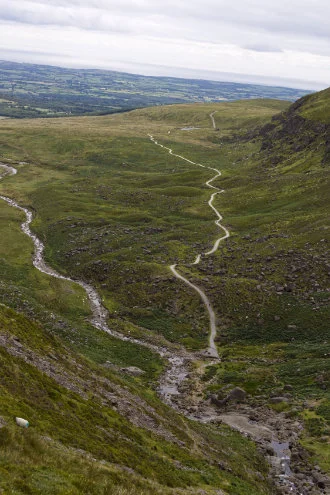
Where to Wild Camp in Ireland?
Now that you know what you need for wild camping in Ireland let’s talk about where to camp. Here are a few of our favourite places:
–The Beara Peninsula: Located between the borders of West Cork and Kerry, the place is just stunning. When you think of Ireland as a picture, then the Beara Peninsula is that picture. A must-visit on your wild camping journey. Visit Discover Ireland for more information.
–The Burren: The Burren is a beautiful place to camp, with its rocky landscapes and stunning views. Whenever you visit the Burren, you know you are in the Burren. The enormous expanse of rocky terrain is unique to this area and is packed with very rare plants and insects. The Burren is an amazing habitat that has gone untouched for centuries.
–Wicklow Mountains National Park: Wicklow Mountains National Park is one of the few national parks in Ireland that allows Wild camping. The fantastic scenic views of the Wicklow Mountains are the perfect backdrop to one of the most scenic landscapes Wicklow has to offer.
Thanks for reading this far. If you want to read more about outdoor cooking equipment I recommend make sure to read my article on the Trangia Cook Set. I think you will find it informative.
The Do’s and Don’ts of Wild Camping in Ireland
Camping in Ireland can be a great way to experience the beauty of nature and escape from the hustle and bustle of everyday life. But before you go, be sure to familiarise yourself with the dos and don’ts of camping in Ireland. Here are some dos and don’ts of wild camping in Ireland:
Do:
-Pack appropriately for all weather conditions. The weather in Ireland can be unpredictable, so be prepared for anything.
-Respect the land and the people who live there. Follow all rules and regulations, and be considerate of others.
-Enjoy yourself! Camping is a great way to relax and enjoy the beauty of nature.
Don’t:
-Leave no trace of your campsite when you leave. This means packing out all of your trash and leaving the area as you found it.
-Camp in prohibited areas. Be sure to familiarise yourself with the rules and regulations before camping.
-Be reckless or destructive while camping. Remember, you are guests in nature’s backyard, so please behave responsibly.
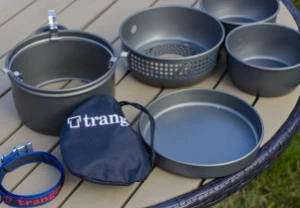
The Seven Leave No Trace Principles
The seven Leave, No Trace Principles are the foundation of responsible outdoor ethics. These principles help to protect the environment and ensure that everyone can enjoy outdoor activities safely and responsibly. The seven principles are:
- Plan Ahead and Prepare
- Be Considerate of Others
- Respect Farm Animals and Wildlife
- Travel and Camp on Durable Surfaces
- Leave What You Find
- Dispose of Waste Properly
- Minimise the Effects of Fire
If we follow these simple principles, we will keep our fantastic wild places as nature intended. This will allow others to enjoy their activities in the great outdoors and keep our wild open spaces as they should be.
Following these principles is very important and something we should all adopt when hiking or wild camping. For more information on Leave No Trace, visit Leave No Trace Ireland
Wild Camping Essential Tips
Suppose you’re looking to enjoy the great outdoors while camping; wild camping is a great option. Wild camping is camping outside of designated areas, such as campsites. Here are some essential tips for enjoying a successful wild camping trip:
- Always research the area you’ll be camping in ahead of time. Make sure you know what to expect regarding terrain and weather conditions.
- Check the weather the night before, and the morning you leave for camp. Weather changes fast in Ireland, and you need to be prepared.
- Always pack appropriately for the conditions. This means packing enough gear to be safe and comfortable and packing light, so you don’t have to carry too much weight. I remember one time on a fine sunny day, climbing the Galtymore Mountains in Munster. I set off with my full kit and wore only my base layer as a top. The weather was amazing, and the sun was scorching. Just as I reached the top of the Galtymore range, the clouds came in, and the temperature dropped dramatically within minutes. I had to put on my mid-layer coat, wool gloves and hat to stay warm. Luckily I always carry what I need and what I might need just in case. Better to have it and not need it than need it and not have it.
- Leave no trace. When wild camping, it’s important to leave no trace of your visit behind. That means taking all your trash with you and not disturbing the natural landscape.
- Be aware of safety concerns. When camping in an unfamiliar area, it’s important to be aware of potential hazards, such as wildlife or poisonous plants.
With these tips in mind, you’re ready to enjoy a safe and comfortable wild camping trip!
Outdoor Personal Chef is a participant in the Amazon Services LLC Associates Program, an affiliate advertising program designed to provide a means for sites to earn advertising fees by advertising and linking to Amazon.com. We also participate in other affiliate programs which compensate us for referring traffic.
